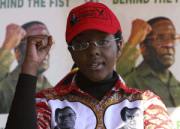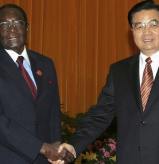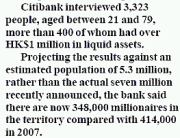15-21 February, 2009
Plucky little Foshan, the town on the west bank of the Pearl River Delta somewhere between Guangzhou and Zhongshan, will dash Hong Kong’s dreams of becoming the global hub for Yuan clearing, according to its mayor. The last time I was up there, the streets were jammed with bicycles, and the night market sold sweet braised dog in greaseproof paper. It has probably come up in the world a bit since then, but it is still in Mainland China, behind the same controls on foreign exchange as anywhere else on that side of the border. Even Hong Kong, with zero barriers to the flow of capital in and out, cannot think of a way it can become the Solar System’s offshore centre for the unconvertible Renminbi. And that is despite years of shameful and embarrassing groveling to the authorities in Beijing by our local leaders, who see this role as the one last chance for the Big Lychee to find a new monopoly to make an easy living out of, now we can no longer be the sole Gateway to the Middle Kingdom.

Operation Bolthole to the rescue. Just as the Pearl of the Orient needs a refuge from market forces – a cosy, rigged haven in which money comes on a plate, in the manner to which we are accustomed – so certain individuals need a sanctuary from the vengeance and hate they face in their Third World homelands and throughout the West. And they are willing to pay for it. Before 1997 Hong Kong did not enjoy much of a comparative advantage in this field, unless we go back a century or so, when it sheltered penniless rebels like Jose Rizal of the Philippines, Sun Yat-sen of China and Ho Chi Minh of Vietnam. But today, free of British interference, we can open our doors to whom we please, subject to the guidance of our generally understanding Motherland.
So far, our activities in this business have centred on Imelda Marcos’s shopping trips, and the exciting Capital Investment Entrant Scheme, which dates back to the days of the Asian Financial Crisis and Chief Executive Tung Chee-hwa, who saw publicity-shy Indonesian-Chinese with bags of cash looking for overseas residency as a great way to prop up our post-bubble asset prices. There were some takers, but the limits to the idea became apparent faster than the Singapore Government would bite the head off anyone suggesting their hyper-clean city was little more than a money-laundering centre for Jakarta’s exiles.
As well as buying a place at JC Castle (just three minutes from the MTR!) the Mugabe family has also installed presidential campaign supporter and daughter Bona in Hong Kong University. So they have obviously taken a liking to our fair city. And there are surely more opportunities ahead. As well as a number of other African states, Burma and North Korea have leaders who might at some stage want a change of pace and a new start, and who would probably look to China for ideas on where to go. Who wants Renminbi business when we can be Asia’s offshore dictator-clearing hub?

Breakfast at the Foreign Correspondents Club with delightful but nervous Administrative Officer Winky Ip, who confirms what today’s Standard editorial says – officials are petrified about public reaction to this afternoon’s announcement on how to use two historic buildings. Despite all the talk about opening the heritage sites up to trendy and cuddly voluntary organizations, the old Tai O Police Station is to be handed over to a ‘conservation’ body run by the Sino Group, property developer to the gentry, who will turn the place into a boutique hotel. Sino already has four hotels in Hong Kong.
“Everyone’s going to say ‘yet another free lunch for a property tycoon’, but it’s just not true,” wails the shapely bureaucrat. “The whole thing was done by the book, and the other proposal just wasn’t economically viable. Didn’t come close. It would’ve been a financial disaster.” I assure her that my heart bleeds for her colleagues. On the one occasion they try desperately not to favour one of our feudal barons, they find they have no choice.
The fate of the other building is no less tricky. The North Kowloon Magistracy will be handed over to a highly respected US-based college of art and design rather than the local Cantonese Opera community, as personified by Liza Wang Ming-chuen. “The college has close ties to Hong Kong, and it’s relevant to young people’s needs, and we’re trying to push creative industries, and again it all works financially… But they’re going to complain that we’re favouring foreigners instead of local culture.” She looks despondently at her congee. “You know,” she hisses, “those opera people – they’re up to their ears in triads!”
She suddenly glances around. “I didn’t say ‘triads’ just now did I?”
“No Winky,” I assure her. “I never heard you say that.”
“My boss is Chairman of the Residents Committee,” Winky is explaining, “and as always when new people move in, they’re putting together a neighbourhood welcome package. So I’m getting our new job-creation scheme intern to buy a few things.” Winky unfolds a shopping list. “Home-made apple pie – someone’s doing that up there. Details of how to pay monthly management fees, a copy of the by-laws about where dogs and maids can go, and discount coupons for Watsons, Pizza Hut and Giordano – that’s all done, apparently. So we’ve got to get… a Hong Kong street map, three Octopus stored value cards, a directory of local baby sitters, plumbers and churches, and an appointment for a cholera checkup at the Tai Po Jockey Club Clinic.” She folds the list up. “It’s as good as done.”



Asia Society speech
Probably not for the transparency and coherence of certain cross-border goings-on, such as the ever-bewildering Lok Ma Chau Loop saga, which will shortly cost the taxpayer another HK$33 million in studies. Reading between the lines, it is hard not to get the impression that the Hong Kong Government is engaging in an elaborate charade, humouring the Shenzhen authorities who for some reason are desperate to develop their patch of toxic mud that history has left on our side of the border. If this is the case, our officials know that the site is too polluted to do anything with and are aware that the mysterious Mainland interests that own the area must have their own agenda – a big-bucks property play or maybe a murky offshore haven for whatever hanky-panky they’ve got going up there. The Hong Kong side play along for fear of the Pearl River Delta apparatchiks bad-mouthing them in Beijing for resisting integration and not being cooperative.
The it-goes-without-saying anonymous Government spokesman quoted in the Standard makes three points. 1. The cost of clearing the mud is believed to be enormous. 2. This cost will not hinder the development. 3. “We plan to establish universities and research institutions. I don’t think the contaminated mud will affect the users much.” In brief, the enormous cost won’t matter and nor will the mud – which sounds suspiciously like someone perfectly secure in the knowledge that the clean-up job from Hell won’t happen. Wait long enough and the Mayor of Shenzhen’s mother-in-law, or whoever holds title to the plot, will get the message and go away.
There is another explanation, namely that the spokesman was one of our highly remunerated Political Assistants. Dress it up in a suit, transport it around in the Secretary’s chauffeur-driven limo and let it recite the Line to Take into guileless reporters’ microphones – and a visionary statesman is born. The Development Bureau’s pageboy is Raymond Cheung, formerly a District Councilor from the Democratic Alliance for the Blah Blah of Hong Kong. In which case the logic-challenging non-sequiturs are not the throwaway glibness of one who knows the truth, but the ramblings of someone trying to assure us that a disaster in the works is no problem, honest, really. So we are none the wiser. Hillary will be well out of it, touching down in the land of morning calm tomorrow to say, “What great math scores, and I just love your kimchi!”
Thurs, 19 Feb
In the SCMP, Philip Bowring, crown prince of moaning gwailos, laments the Hong Kong Government’s submission to two powerful lobbies that in various ways cheat, exploit or otherwise oppress the good people of the Big Lychee. One is the mafia of ‘indigenous’ New Territories residents led by Heung Yee Kuk Chairman Lau Wong-fat. It is a mob that believes itself entitled to – among other things – wreck the countryside for illegal profit with impunity, and the response of our dashing Chief Executive Donald Tsang has been to appoint Lau to his cabinet, the Executive Council. The other is the aristocracy of property and other tycoons who believe insider trading is their birthright. Our top officials, having just pressured regulators into withdrawing a proposed ban on such activities, apparently agree. Why not, Bowring asks, appoint rumour-ridden gambling/entertainment boss Albert Yeung to our top policymaking body? What about letting chief property baron Li Ka-shing and friends select the next head of the Securities and Futures Commission?
There is no shortage of purely domestic reasons why the Government is doing favours to these two interests. New Territories groups provide dependable and effective help in the fight against pro-democrats during election times, not only getting the vote out, but intimidating opposition campaign workers. As for the tycoons who opposed the blackout period on trading their own stock before the release of financial results, they are essentially the same tycoons who donated large sums to Sir Bow-Tie’s quasi-election campaign in 2007. So it looks like plain, simple political sleaze. We got your supporters elected, now get your officials to look the other way when our buddies use land without the right permits. We made big donations to your campaign, now get these regulators trying to ban insider trading off our backs. And, as Bowring points out, there is probably good, honest bribery involved too – envelopes changing hands in the New Territories, and of course senior civil servants mysteriously getting top jobs with developers after they retire.
What he doesn’t ask is where, or at least whether, Beijing fits into all this. As it says on page 185 of the good book …

Most people assume that the Mainland authorities have better things to do with their time than monitor the Big Lychee all day, handing out guidance to officials and fine-tuning local decisions. Constitutionally, however, China’s leadership undeniably has the right to micro-manage Hong Kong completely. The PRC is a unitary state, and all powers exercised by regional and lower levels of the structure are delegated by the Central People’s Government at the top.
So it is not at all fanciful to imagine that back in the 1980s, Chinese officials who understood little about business, economics or Hong Kong were prepared to make some good deals as they were building up a local United Front. A conspiracy theorist could easily believe that a highly classified undertaking dating from that time gives a small group of families a veto over local policies and a hotline to the Politburo in return for being patriotic and keeping their wealth in Hong Kong. The grubby and grasping aboriginals north of Boundary Street would have been even easier to buy off. Compared with black helicopters, the Bilderberg cabal, the Jewish-run media, the Trilateral Commission and lizards from outer space secretly controlling everything behind the scenes, it sounds nothing more than logical.
Waking to hear Chief Secretary Henry Tang use the word ‘complementarities’ on the radio seems to put me in a hyper-alert mood this morning. Which is why, within seconds of receiving my copy of the Standard, a minor editorial blunder leaps off the front page and demands my full attention. In estimating the number of millionaires in Hong Kong, the lead story says, Citibank extrapolated from a small sample to a population of 5.3 million – when (some pedant adds) everyone knows the Big Lychee has just passed the 7 million mark. The reason, staring every reader in the face but overlooked by the copy editors, is of course that the survey covered only the 21-79 age group.
The Citibank study, if accurate, shows that of these 5.3 million, only 348,000, or 6.5 percent, have had the gumption to accumulate HK$1 million – a sum equivalent to just US$128,000. This might be excusable among the 20-somethings just starting out in economic production, or ‘life’ as it is sometimes known. But it is a daunting thought that over 93 percent of the adults walking around out there lack a level of readily available wealth that at least qualifies as a halfway decent safety net.
Many, it goes without saying, are on wages that are a small fraction of Hong Kong’s much-vaunted per-capita GDP and barely cover the cost of supporting a family, plus the cartels, plus the world’s most overpaid civil service. Some have a mortgage to pay off, and must toil for 20 years in order to acquire a few precious square feet of Cheung Kong or Sun Hung Kai concrete box. Others, fearful of their children being turned into rote-learning zombies, have dispatched their offspring to be educated at great expense overseas. Yet more have frittered money away on the horses, in Macau casinos, or on face-creating status symbols. How will they all survive in retirement? At least they will always be able to afford the Standard!
And maybe Tang’s complementarities will come to the rescue. These arise from the exciting Outline of the Plan for the Reform and Development of the Pearl River Delta, and would appear to involve unprecedented quantities of the cooperation, integration, partnership, win-wins, synergies, collaboration, liaison and coordination that make cross-border affairs so riveting and meaningful. Even the National 12th Five-year Plan crops up – there is so much to appear to take seriously, I just wouldn’t know where to start. And it seems Tang and his counterparts from Macau and Guangdong had the same problem. One paragraph, with excess verbiage excised, reads…



Sesame Street today was brought to you by the word ‘complementarities’.

stores
Dymocks, IFC Mall
& other HK Dymocks
(some, probably, maybe)
online
Hong Kong & worldwide
USA & worldwide
UK
Canada
Germany
Japan
France